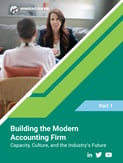4 min read
The Importance of Investing in Employee Experience: Hiring, Retention, Boomerang Opportunities, and More
In the accounting industry’s current labor market, investing in employee experience is crucial to sustaining your firm’s success. To retain top...





